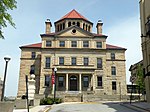McMillan Hall is a building on the campus of Washington & Jefferson College in Washington, Pennsylvania, United States. Built in 1793, it is the only surviving building from Washington Academy. It is the eighth-oldest academic building in the United States that is still in use for its original academic purpose and is the oldest surviving college building west of the Allegheny Mountains.The building is situated on the corner of South Lincoln Street and East Wheeling Street in Washington, Pennsylvania. It is 120 feet (37 m) by 40 feet (12 m) in size. McMillan Hall is named after College founder and Presbyterian missionary John McMillan. Throughout its history, McMillan has also been known as the "Old College," the "Academy Building," and the "Administration Building." It is currently home to administrative offices, including the Office of Communications and the Office of the President. The College's ceremonial mace is carved from the original wooden pillars.In 1977, it was listed on the National Register of Historic Places. The National Register described the building's architecture as achieving a "unique quality and charm from the fact that vernacular builders selectively borrowed Georgian, Roman Classical, Adamesque, and other European Renaissance architectural forms, elements, and details and combined them in the builder's own esoteric way." The National Register described its historical importance as a "unique variation of a Western Pennsylvania stone building," calling it "irreplaceable on a regional or national level."In 1793, the Trustees of Washington Academy authorized the construction of a new building. Alexander Hamilton and Henry Lee stayed in the hall during their visit during the Whiskey Rebellion. The 2-story stone building was ready for occupation in 1797. Two wings and a portico were added in 1818, allowing the building to house dormitories and dining facilities for students. In 1900, the building was saved from planned demolition by a benefactor who insisted that it be preserved. In order to make room for the proposed library, it was moved 40 feet (12 m) towards Lincoln Street. The building was remodeled in 1912 to house administrative offices. In 1928, the north wing, which had been used as student housing, was remodeled to create office space. At various times, the basement housed a dining hall, a lunch counter, classrooms, and the bookstore. It was restored to its 18th-century appearance in the late 1980s.
It is designated as a historic public landmark by the Washington County History & Landmarks Foundation.












